Over 30 years of anarchist writing from Ireland listed under hundreds of topics
October 2004
Lessons from the Summit Protests - Prague, Quebec, Genoa
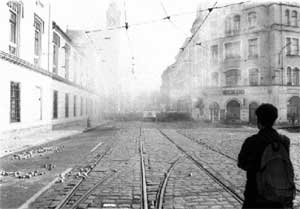 In recent years anarchism has had a re-emergence in the popular consciousness. For many people what was a piece of social history, a slogan used by cartoon terrorists or a word associated with punk rock is now a form of political struggle no matter how hazily understood. One of the reasons for this has been the role anarchists have played in the anti-globalisation movements and especially in the large anti-globalisation demonstrations in the recent years.Despite the very real problems associated with the idea of 'summit hopping' and spectacular protest these manifestations have provided a public face of anarchism and at least as importantly have given anarchists an opportunity to work together and with likeminded groups in relatively large numbers. The impact of these demonstrations has been global, showing many that despite the end of the Cold War and the subsequent much heralded 'end of history' that there is resistance to the neo-liberal project and that social struggle has not gone away. The rise in radical activity in Ireland, amongst other places, shows that events in far off lands can also influence and promote resistance at home.
In recent years anarchism has had a re-emergence in the popular consciousness. For many people what was a piece of social history, a slogan used by cartoon terrorists or a word associated with punk rock is now a form of political struggle no matter how hazily understood. One of the reasons for this has been the role anarchists have played in the anti-globalisation movements and especially in the large anti-globalisation demonstrations in the recent years.Despite the very real problems associated with the idea of 'summit hopping' and spectacular protest these manifestations have provided a public face of anarchism and at least as importantly have given anarchists an opportunity to work together and with likeminded groups in relatively large numbers. The impact of these demonstrations has been global, showing many that despite the end of the Cold War and the subsequent much heralded 'end of history' that there is resistance to the neo-liberal project and that social struggle has not gone away. The rise in radical activity in Ireland, amongst other places, shows that events in far off lands can also influence and promote resistance at home.
Summit Protests and Networks
 With the emergence of the summit protest movement into the public eye after J18 and Seattle, anarchism gained an influence way beyond what the numbers of anarchists and the level of anarchist organisation might have led you to predict. Quite quickly in the English speaking world, anarchism emerged from being a fairly obscure and historical critique of the left to become one of the main poles in the globalisation movement.It was not the long-existing anarchist organisations that achieved this. For the most part it was a new generation of activists using much more informal methods of organisation and communication. Rather than seeking to build one powerful and united organisation, they built thousands of small, informal and often quite short-lived ones. In fact 'built' is probably too strong a word for a process that in many cases consisted of a few friends coming together to travel to a protest and act together during it.
With the emergence of the summit protest movement into the public eye after J18 and Seattle, anarchism gained an influence way beyond what the numbers of anarchists and the level of anarchist organisation might have led you to predict. Quite quickly in the English speaking world, anarchism emerged from being a fairly obscure and historical critique of the left to become one of the main poles in the globalisation movement.It was not the long-existing anarchist organisations that achieved this. For the most part it was a new generation of activists using much more informal methods of organisation and communication. Rather than seeking to build one powerful and united organisation, they built thousands of small, informal and often quite short-lived ones. In fact 'built' is probably too strong a word for a process that in many cases consisted of a few friends coming together to travel to a protest and act together during it.
Media Mayhem - Anarchists and the Mass Media
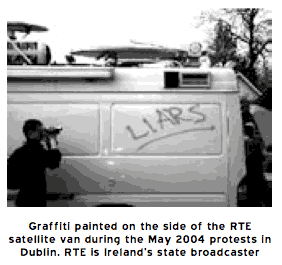 On one level the phrase "the media" simply refers to the various modern technologies for transmitting ideas to large populations, such as newspapers, television, magazines, radio and the new kid on the block, the Internet. These are extremely useful tools. They allow people to know what's happening in the world and hence share some common understanding with strangers. A fundamental precondition for achieving the type of revolutionary change that anarchists seek is that a large number of people actively desire it, or at the very least are open to it. Indeed, communicating "our beloved propaganda" to the masses has always played a major part in anarchist activity and hence we require the media. However, today, when we talk about the media, we also implicitly refer to the corporate machine that comes very close to operating monopoly control over mass communication.
On one level the phrase "the media" simply refers to the various modern technologies for transmitting ideas to large populations, such as newspapers, television, magazines, radio and the new kid on the block, the Internet. These are extremely useful tools. They allow people to know what's happening in the world and hence share some common understanding with strangers. A fundamental precondition for achieving the type of revolutionary change that anarchists seek is that a large number of people actively desire it, or at the very least are open to it. Indeed, communicating "our beloved propaganda" to the masses has always played a major part in anarchist activity and hence we require the media. However, today, when we talk about the media, we also implicitly refer to the corporate machine that comes very close to operating monopoly control over mass communication.
Anarchists Playing the Media Game
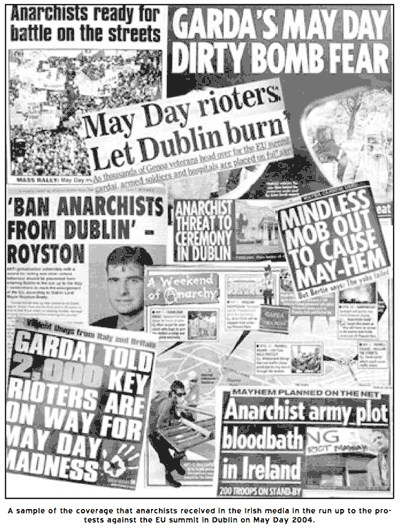 The Dublin Grassroots Network put a number of structures in place to avoid some of the pitfalls of dealing with the media. Perhaps the two biggest problems in dealing with the media are firstly that the media can, through the questions they ask and the pressures they bring, begin to set the political agenda of the group. Secondly servicing the media machine can take up all a group's time and energy (to the detriment of the other activity).
The Dublin Grassroots Network put a number of structures in place to avoid some of the pitfalls of dealing with the media. Perhaps the two biggest problems in dealing with the media are firstly that the media can, through the questions they ask and the pressures they bring, begin to set the political agenda of the group. Secondly servicing the media machine can take up all a group's time and energy (to the detriment of the other activity).
An anarchist look at the ideas of James Connolly - the single most important figure in the history of the Irish left
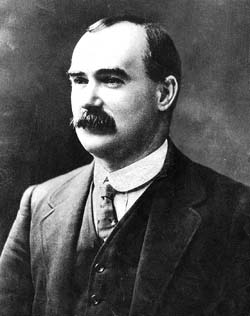 James Connolly is probably the single most important figure in the history of the Irish left. He was an organiser in the IWW in the USA but in Ireland is best known for his role in building the syndicalist phase of Irish union movement and for involving the armed defence body of that union, the Irish Citizens' Army in the 1916 nationalist insurrection. This left a legacy claimed at one time or another not only by all the Irish left parties but also by the nationalists of Fianna Fail and Sinn Fein. In this article I will attempt to look at the long neglected anarchistic aspects of Connolly's thought and ask the question was Connolly a libertarian?
James Connolly is probably the single most important figure in the history of the Irish left. He was an organiser in the IWW in the USA but in Ireland is best known for his role in building the syndicalist phase of Irish union movement and for involving the armed defence body of that union, the Irish Citizens' Army in the 1916 nationalist insurrection. This left a legacy claimed at one time or another not only by all the Irish left parties but also by the nationalists of Fianna Fail and Sinn Fein. In this article I will attempt to look at the long neglected anarchistic aspects of Connolly's thought and ask the question was Connolly a libertarian?
Workers Without Bosses - Workers' Self-Management in Argentina
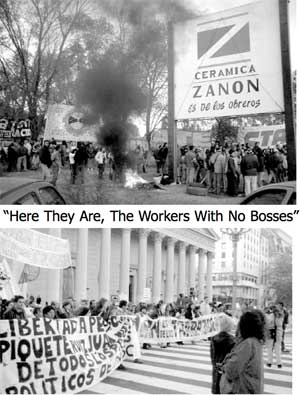 The last 30 years in Latin America have seen the introduction of neo-liberal policies - structural adjustment programmes, austerity measures, a shift from the industrialisation and "internal accumulation" model to one that favours promiscuous financial capital, free trade agreements and an increasing economic dependency of the region on the USA. As usual, the people have suffered the worst part of these policies - high levels of unemployment and depression of wages and the standard of living. People's most immediate and basic needs were expendable when it came to the real priorities of local governments: the payment of the fraudulent external debt & the maintenance of high levels of profits for both the local and the foreign bosses.
The last 30 years in Latin America have seen the introduction of neo-liberal policies - structural adjustment programmes, austerity measures, a shift from the industrialisation and "internal accumulation" model to one that favours promiscuous financial capital, free trade agreements and an increasing economic dependency of the region on the USA. As usual, the people have suffered the worst part of these policies - high levels of unemployment and depression of wages and the standard of living. People's most immediate and basic needs were expendable when it came to the real priorities of local governments: the payment of the fraudulent external debt & the maintenance of high levels of profits for both the local and the foreign bosses.
No Global - The People of Ireland Versus the multinationals
Essentially it is an account of the various environmental clashes that have taken place in Ireland since the mid-70s when the Irish Government's policy of attracting multinational corporation into Ireland - in particular in the chemicals and pharmaceuticals sector - moved into full swing. In terms of being a record of these many struggles, No Global is a very useful compendium with a lot of first hand information as well as useful analysis. The author was involved in some of the events he addresses and this adds a particular validity to the account.

